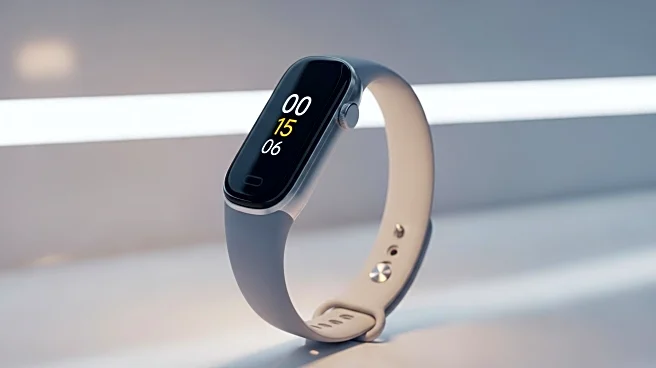What's Happening?
The Fitbit Versa 4 fitness smartwatch has garnered positive reviews from users who appreciate its simplicity and functionality compared to the Apple Watch. Reviewers have highlighted the Versa 4's long battery life, which lasts several days longer than the Apple Watch, and its user-friendly design. The smartwatch offers a range of fitness tracking features, including a Daily Readiness score that assesses heart rate variability, sleep quality, and activity levels to guide exercise decisions. Additionally, the Versa 4 includes GPS tracking for outdoor activities, over 40 exercise modes, continuous heart rate monitoring, and sleep tracking capabilities. Users have praised its waterproof design, allowing it to be worn while swimming or showering, and its quick charging feature. The Fitbit Versa 4 is currently available at a discounted price, making it an attractive option for those seeking a comprehensive fitness tracker.
Why It's Important?
The positive reception of the Fitbit Versa 4 highlights the growing demand for fitness trackers that offer both functionality and ease of use. As consumers increasingly prioritize health and wellness, devices like the Versa 4 provide valuable insights into physical activity and overall health. The smartwatch's affordability compared to competitors like the Apple Watch makes it accessible to a broader audience, potentially increasing its market share. The emphasis on features such as heart rate monitoring and sleep tracking reflects a shift towards more personalized health management tools. This trend could influence the development of future wearable technology, encouraging manufacturers to focus on user-friendly designs and comprehensive health tracking capabilities.
What's Next?
With the Fitbit Versa 4's success, other companies in the wearable technology industry may seek to enhance their offerings to compete. This could lead to innovations in fitness tracking features and improvements in battery life and design. As the market for health-focused wearables expands, consumers can expect more options tailored to specific fitness needs and preferences. Additionally, the integration of advanced health metrics and personalized recommendations may become standard in future devices, further supporting individuals in their health and wellness journeys.
Beyond the Headlines
The popularity of devices like the Fitbit Versa 4 underscores the cultural shift towards proactive health management and the use of technology to support personal well-being. As wearables become more sophisticated, ethical considerations regarding data privacy and security will become increasingly important. Companies will need to address these concerns to maintain consumer trust and ensure the responsible use of health data. Furthermore, the widespread adoption of fitness trackers may influence public health initiatives, encouraging individuals to engage in regular physical activity and monitor their health metrics.









